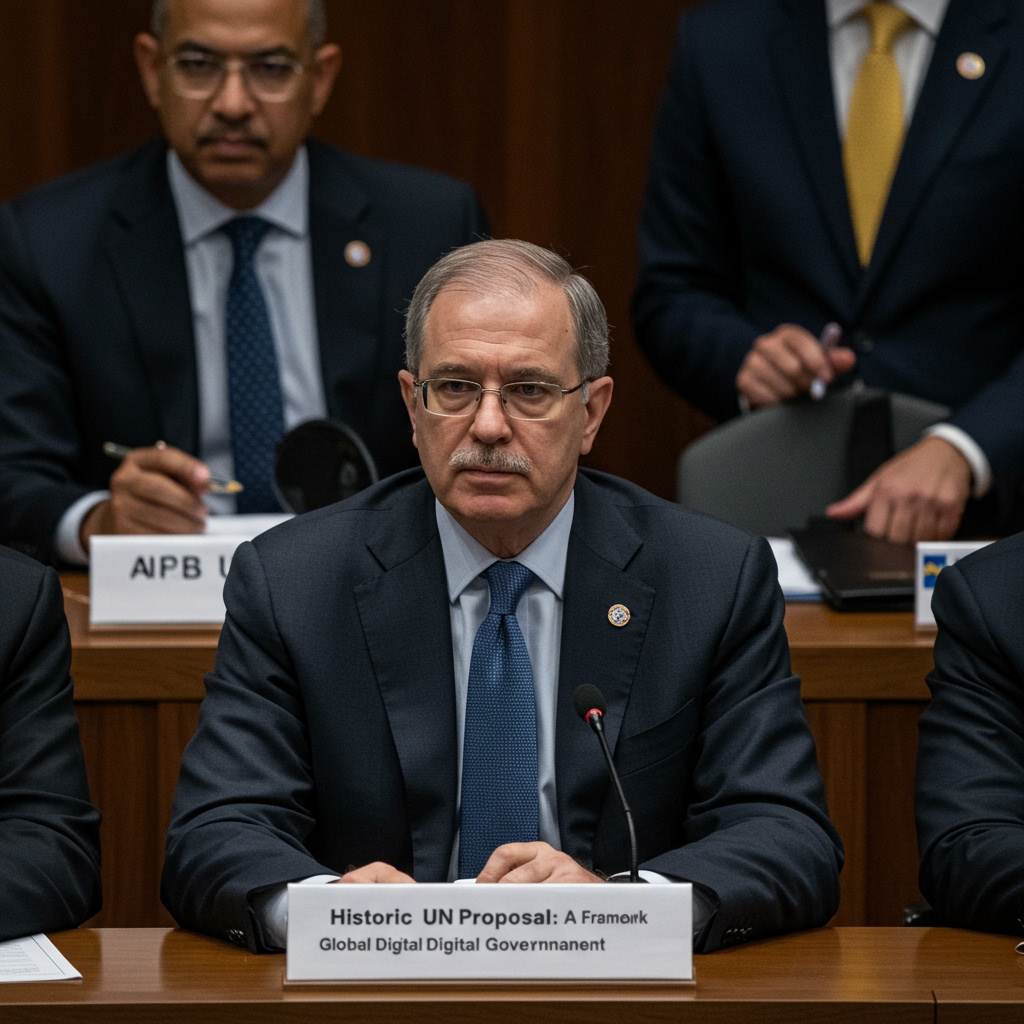UN Task Force Unveils Draft Global Digital Governance Framework
Geneva, Switzerland – The United Nations Task Force on Digital Cooperation has officially released a comprehensive draft framework aimed at establishing international standards for the increasingly complex digital landscape. This significant proposal represents a concerted effort to bring greater clarity, stability, and cooperation to critical areas such as artificial intelligence, data privacy, and cybersecurity on a global scale.
The unveiling marks a pivotal moment in international efforts to govern digital technologies, which are rapidly transforming societies and economies worldwide. The Task Force, a dedicated body within the United Nations system, has diligently worked over an intensive 18-month period to develop this foundational document. Their process involved extensive consultation and collaboration, incorporating valuable input from a diverse group of 15 member nations. This lengthy, multi-stakeholder approach underscores the complexity and global reach of the issues at hand, seeking to build consensus among countries with varying digital infrastructures, legal traditions, and national priorities.
Key Pillars of the Proposed Framework
The draft framework is built upon several core pillars designed to address the most pressing challenges and opportunities presented by the digital age. It outlines key principles intended to guide both national policy and international cooperation.
One major focus is artificial intelligence (AI). The proposal seeks to establish ethical guidelines, transparency requirements, and accountability mechanisms for the development and deployment of AI systems. Recognizing the immense potential benefits of AI alongside potential risks such as bias, job displacement, and autonomous weapons, the framework aims to foster responsible innovation while mitigating harm. It advocates for human-centric AI development that aligns with human rights and democratic values.
Another critical pillar is data privacy. In an era of massive data collection and cross-border data flows, protecting personal information is paramount. The framework proposes international standards for data protection, including principles related to consent, data minimization, security measures, and individual rights regarding their data. It seeks to facilitate secure and responsible cross-border data flows while ensuring that fundamental privacy rights are upheld, potentially addressing issues like data localization requirements and international data transfer mechanisms.
Cybersecurity forms the third major component. The proposal addresses the need for enhanced global cooperation to combat cyber threats, including cybercrime, cyber espionage, and attacks on critical infrastructure. It suggests measures for improving international information sharing, developing common cybersecurity standards, and building capacity in developing nations. The goal is to create a more resilient and secure global digital environment, fostering trust and stability necessary for continued digital development.
Proposed International Oversight Body
Perhaps one of the most significant and ambitious aspects of the draft framework is the suggestion for the creation of a new specialized international body. This proposed entity would be tasked with the crucial role of overseeing the implementation of the framework’s principles and standards. Its mandate would likely include monitoring compliance, providing technical assistance to member states, and critically, serving as a neutral mediator for disputes that arise between nations or other stakeholders concerning digital issues covered by the framework.
The draft proposal notably suggests that this new body could potentially be housed in Geneva, Switzerland. Geneva is already a major hub for international organizations, including various UN bodies and agencies dealing with global governance, trade, and humanitarian issues. Locating the new digital body there could leverage existing infrastructure, expertise, and diplomatic networks, facilitating its integration into the broader multilateral system.
Principles for Innovation and Data Flow
Beyond the specific pillars of AI, data privacy, and cybersecurity, the framework articulates broader principles designed to guide the digital future. It emphasizes the importance of promoting responsible digital innovation as a driver of economic growth and social progress. This includes fostering an environment where new technologies can flourish, while ensuring they are developed and used in ways that benefit humanity as a whole and do not exacerbate inequalities or create new risks.
The framework also seeks to ensure seamless and beneficial cross-border data flows. Recognizing that data is increasingly the lifeblood of the global economy, the proposal aims to strike a balance between national interests in regulating data and the need for data to move efficiently and securely across borders to support trade, research, and communication. The principles aim to prevent unnecessary barriers to data flow while safeguarding privacy and security.
The Path to Ratification: March 2025 Conference
The release of this draft is not the final step, but rather a critical phase leading towards potential international adoption. The framework is now scheduled for formal discussion and potential ratification during a special UN conference specifically dedicated to this topic. This high-level conference is currently planned to take place from March 15-17, 2025.
The conference will bring together representatives from UN member states, alongside potentially civil society organizations, private sector representatives, and academic experts. It will be the forum for detailed debate, negotiation, and potentially amendment of the draft text. The goal is to secure widespread agreement and eventual ratification by member states, which would lend the framework significant international legitimacy and authority.
Ratification by a sufficient number of nations would pave the way for the implementation of the proposed standards and the potential establishment of the new international digital body. However, the path to consensus on such complex and nationally sensitive issues is expected to involve robust debate and negotiation in the coming months.
This proposal represents the most significant push yet from the international community, led by the United Nations, to create a coordinated global rulebook for the digital age. Its success will depend on the willingness of member states to find common ground and commit to a shared vision for a safe, open, and beneficial digital future for all.





